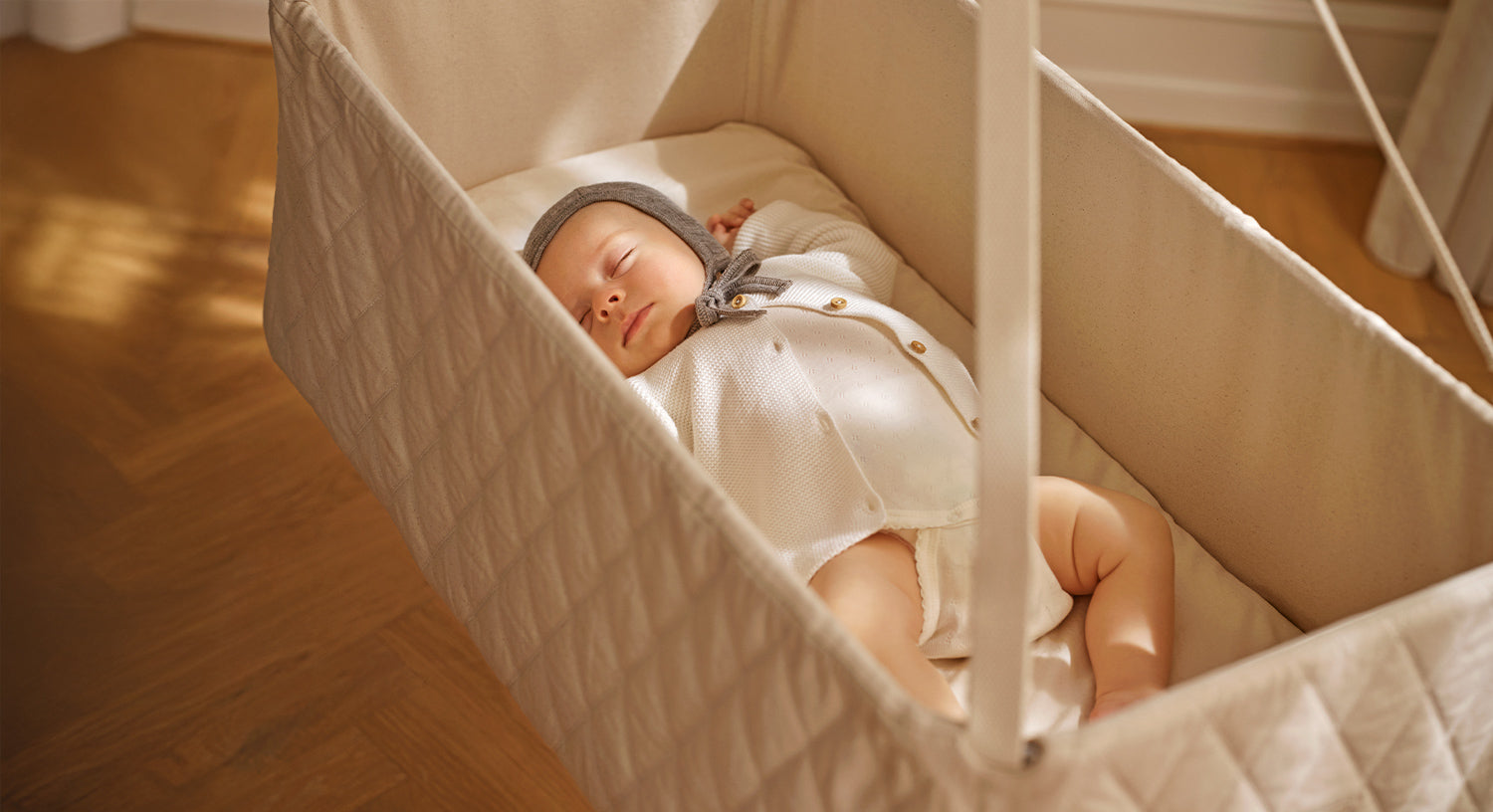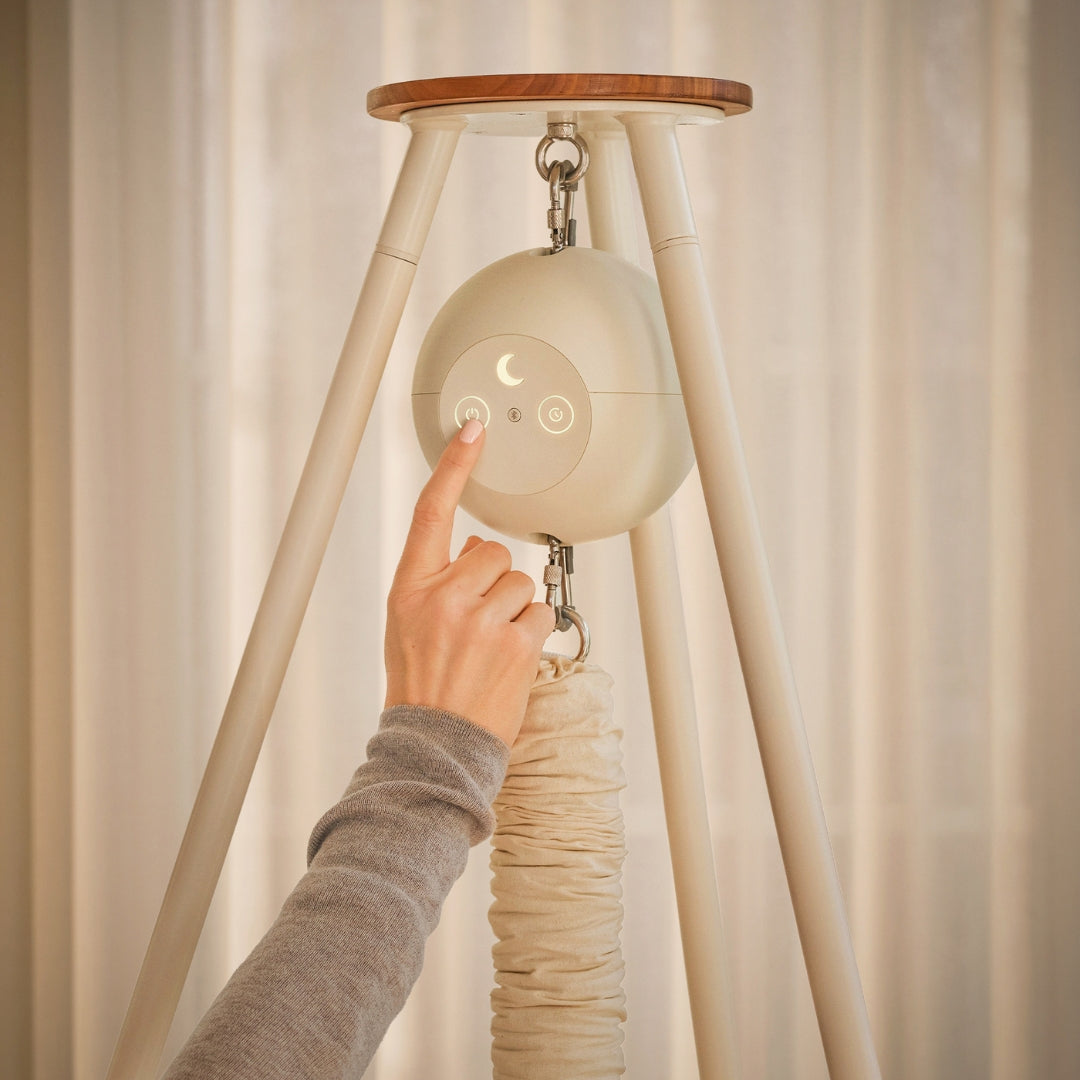


When you're pregnant, everyone jokes that you'll never sleep again once your little one arrives. For some, that turns out to be pretty close to the truth—or at least it feels that way at times.
Baby hammocks, baby wraps, yoga balls, white noise, pink noise, blackout curtains, and pacing around to hit 10,000 steps a day—life with a newborn can feel like an endless quest for just a little more sleep.
But there are a few simple things you can do to support your baby’s sleep and, just as importantly, gain a better understanding of how sleep works. Sleep counselor Mia Bjørnfort from the Danish website Sovende Børn (Sleeping Children) shares her insights on the 10 things all parents should know about their baby’s sleep habits.
1. Your baby is naturally wired to seek physical closeness
Ever notice how your baby sleeps soundly in your arms but wakes up the moment you put them down—or shortly after?
This is completely normal. Babies are instinctively programmed to seek out physical contact. Your little one doesn’t know they were born into the modern world with safe cribs and baby monitors. Their instincts are still wired for survival, as if they were in a world full of potential dangers. Being close to a caregiver means warmth, protection, and access to food, so when they sense separation, their natural response is to call out for you.
This is why baby hammocks, cradles, or baby wraps can be so comforting. The gentle rocking movements mimic the sensation of being held and signal safety to your baby’s subconscious.
If your baby resists sleeping alone, there’s nothing wrong—it's simply how they’re designed. The same goes for older children who still seek physical comfort at bedtime or during the night. It’s all part of their need for connection and reassurance.
2. Your baby already knows how to sleep—they don’t need to “learn” it
Long before birth, your baby spent most of their time in the womb drifting between sleep and wakefulness. No special training was required—just the soothing rhythms of your body: the steady beat of your heart, the gentle motion of your movements, and the muffled sounds of digestion and blood flow.
Your baby already knows how to sleep. But now, outside the womb, everything is different. New sensations, unfamiliar noises, bright lights, and even something as simple as a slightly itchy diaper can make sleep more challenging. Your little one is adjusting to a world filled with sensory input they've never encountered before.
This transition takes time, but the good news is that deep, restful sleep will come naturally—with your love and support. Every time you rock, cuddle, or sing your baby to sleep, you’re helping them understand what sleep looks and feels like in this new environment.
You might assist your baby in falling asleep thousands of times before they can do it more independently. But each time, you're laying the foundation for them to develop the ability to fall asleep on their own—when they are developmentally ready. Whether that happens in a few months or a few years, it’s all part of a natural process.
3. Your baby waking during the night is natural and important
Frequent night wakings are a normal part of a baby’s first year—and often continue into the second year as well. While this can be exhausting for parents, it serves an essential purpose for the baby.
Waking up during the night is a built-in survival mechanism. It ensures that your baby remains close to you and receives the milk, warmth, and reassurance they need to feel safe and secure. These nighttime interactions also play a crucial role in regulating your baby’s physiology—helping to stabilize heart rate, blood sugar, blood pressure, and breathing.
In the early months, these frequent awakenings support the transition from life in the womb to life outside it. As your baby grows, they continue to play a role in developmental leaps and changes.
Because of these benefits, experts recommend that babies sleep in the same room as their parents for at least the first six months—ideally for a year or longer. The presence of a caregiver helps regulate a baby’s sleep-wake cycles, providing subtle cues through breathing patterns and movements that support their natural rhythms.
4. Your baby needing help to fall asleep is completely natural
From the moment of conception, your baby has been gently rocked, surrounded by soft, rhythmic sounds, and constantly comforted by warmth and physical contact. In the womb, they never experienced hunger, cold, bright lights, or loud noises—everything was perfectly tailored to their needs.
After birth, your baby instinctively seeks the familiar sensations that once kept them calm. Rocking, soothing sounds, and close contact help regulate their nervous system—just as routines and habits do for adults. The difference is that while adults can rationalize changes to routines, babies lack the life experience to understand that a new environment or way of falling asleep is safe.
Every experience your baby has helps shape the connections in their developing brain. It takes countless repetitions for these neural pathways to form, and just as many loving interactions to strengthen them.
So the next time you rock, cuddle, or soothe your baby to sleep, remember: you're not just helping them rest—you’re building the foundation for their ability to self-soothe and sleep independently in the future.
5. Feeling groggy is normal
As an adult, your sleep cycle lasts about 90 to 120 minutes. Your baby’s cycle, however, is much shorter—only around 45 minutes. This constant difference in sleep rhythms can leave you feeling groggy, dizzy, or mentally foggy after multiple nighttime awakenings. While knowing this won’t make you less tired, understanding why you feel this way can help you cope.
Repeatedly being woken up prevents your body from completing its natural sleep cycle. In response, your body attempts to adjust by prioritizing deep sleep over light sleep. However, when you’re suddenly woken from deep sleep, you feel disoriented—like surfacing from the deepest part of the ocean. In contrast, waking from light sleep feels more like resting near the shore.
If possible, try to get two to three hours of uninterrupted sleep whenever you can. Even if it’s only once a week, it can make a significant difference in how you feel. The longer your sleep is fragmented, the more you may notice difficulties with memory, decision-making, and even forming coherent sentences. Some parents struggle more with sleep deprivation than others, and that’s completely natural—everyone’s body responds differently.
So if you’re feeling forgetful or mentally foggy, it’s not "pregnancy brain" or "mumnesia"—it’s just your brain working overtime to function on limited sleep. Be kind to yourself, and know that this phase won’t last forever.
6. Your baby's development does not depend on long stretches of sleep
Your baby doesn't need to sleep for hours at a time to grow and develop normally. In fact, their physiology is designed for frequent waking—sometimes for years.
It’s natural for parents to worry about whether their baby is getting enough sleep, especially if they wake every hour or two at night or only take short naps during the day. Many wonder: Is my baby getting enough deep sleep? Could this affect their development? While these concerns are completely understandable, they’re usually unnecessary. In most cases, babies get exactly the amount of sleep they need.
A baby's sleep cycle is naturally tailored to their stage of development. Since waking to seek comfort is biologically normal, their sleep pattern includes both deep and light sleep, each serving a purpose. If your baby is briefly woken by noise or another disturbance, their body will automatically adjust during the next sleep cycle to compensate.
In other words, your baby instinctively regulates their own sleep. You support this process through comforting tools like a baby hammock, cradle, feeding, lullabies, or white noise—helping them get the rest they need in their own way and time.
7. How daylight, fresh air, and routine help both you and your baby sleep better
Sleep is regulated by two key processes: sleep pressure and the circadian rhythm. Understanding how these work can help both you and your baby get better rest.
Sleep Pressure: The Body’s Natural Sleep Drive
Sleep pressure, also called homeostatic sleep drive, is regulated by a chemical called adenosine. This substance builds up in the brain while we’re awake, creating an increasing need for sleep. Eventually, the pressure becomes so strong that sleep becomes unavoidable. Once we sleep, adenosine levels drop, resetting the balance.
For newborns, this process happens quickly—they become tired after only a short period but also recover rapidly. This is why their sleep patterns are fragmented and unpredictable in the early weeks.
Circadian Rhythm: The Body’s Internal Clock
The second sleep regulator is the circadian rhythm, which aligns sleep-wake cycles with day and night. This rhythm is primarily influenced by light exposure but is also supported by social activities, like feeding and interaction.
The circadian rhythm resets each morning when natural light reaches the eyes. Even a small shift in this timing—just an hour or two—can cause a disruption similar to jet lag.
When babies are born, they don’t yet have a circadian rhythm. Their sleep is entirely driven by sleep pressure, and they wake frequently around the clock. Around three to four months, their body begins producing melatonin, the hormone that signals nighttime, in more significant amounts.
How to Support Your Baby’s Sleep Rhythms
Research suggests that babies exposed to natural daylight and daytime activity from birth begin producing melatonin earlier than those who spend more time in dim or artificial light. This means that getting outside and keeping active during the day can help your baby learn the difference between night and day more quickly.
The benefits aren’t just for your baby—your own sleep-wake cycle also becomes more regulated through daylight exposure and activity. If you're breastfeeding, your body's milk production even adapts to reflect your own rhythm, releasing wakefulness and sleep hormones at the appropriate times. This, in turn, helps reinforce your baby's developing circadian cycle.
So, to gently support your baby's natural sleep development, spend time outdoors, soak up the daylight, and enjoy some fresh air together—it’s one of the simplest and most effective ways to encourage healthier sleep for both of you
8. Milk is an easy and natural shortcut to sleep
Breast milk contains hormones that play a key role in helping your baby establish and regulate their circadian rhythm, benefiting both parent and child.
Mother's milk is designed to soothe, comfort, and satisfy both hunger and thirst, while also signaling the difference between night and day. Whether it's breast milk or formula, feeding helps calm your baby and can guide them toward sleep.
The entire nursing experience is a natural way to encourage sleep. The act of feeding, the comforting presence of the mother, the hormones in the milk, and the release of CCK hormones in the baby’s stomach all work together to help your baby feel drowsy.
At night, breast milk also contains melatonin and other sleep-promoting hormones. Since your baby needs milk regardless, it’s the perfect opportunity to support a peaceful, restful sleep.
9. Sleep comes in many forms
There’s no single “right” or “wrong” way to sleep. While some sleep patterns may not be effective, that’s a different matter. Sleep is simply sleep, whether your baby naps for 30 minutes in a baby wrap, enjoys a one-hour nap in bed, or has 45 minutes of milk in a baby hammock followed by a bottle on the sofa. All sleep is good sleep, as long as it works for you.
Some babies love the pram as soon as they lie in it and can happily spend three or four hours there, while others cry at the sight of it but will rest peacefully in a baby hammock or cradle, leaving you wondering why it's so quiet.
Some babies need to nurse or bottle-feed every hour, while others finish their meals quickly and sleep for several hours afterward. Some babies move around a lot in their sleep and benefit from being wrapped tightly in a blanket to stay comfortable, while others can't tolerate any blanket or duvet without feeling too hot or upset. Some babies sleep 15 hours a day by nine months, while others only sleep nine hours. Some take multiple short naps, while others prefer one long nap and then stay awake for the rest of the day. Some babies go to bed at 7 p.m., while others stay up late, watching movies with mom and dad until the early hours.
Every scenario above is perfectly normal. It's about discovering what works best for you and your child. And remember, this may change week by week or month by month as they grow and develop.
As long as your baby is growing as expected, has wet nappies, is generally happy, enjoys playtime, and seeks your affection, it's a sign they’re getting enough sleep.
So, it's worth repeating: there is no "right" or "wrong" sleep. Find the solutions that work for your family and ignore the rest.
10. Your baby can tolerate new ideas and routines
Your baby is not made of porcelain. Whether it’s your first or sixth child, your baby is designed to handle you trying new things, even if you don’t always know exactly what you’re doing. Both you and your baby are mammals – born to figure it out together as you try your hand at it.
There are countless books, blogs, professionals, and articles online – like the one you're reading now – that can be useful as guides. But keep in mind that some advice may not be helpful and could even trigger more worries.
Your baby knows you and looks to you to make sense of the world around it. It will communicate its needs, adjusting its cries or volume to ensure you understand. And that’s something you need to remember.
The two of you must find your rhythm together. Sometimes, you’ll discover what works right away. Other times, you may realize that what you tried wasn’t quite right.
Articles like this one can serve as a helpful reference so you don’t have to start from scratch. Most of the suggestions will probably work well for your baby, as babies share many similarities.
However, some things might not suit your baby at all. If you place your baby in the cot and it cries, but your baby happily babbles in the baby hammock or cradle, then you’ve found your solution. And that’s what matters, regardless of what books, professionals, or online articles say.
Experiment with different routines, aids like baby wraps, blankets, white noise, varying the speed of the cradle motor, or trying different sized baby wipes. Use whatever works as long as it does, and when it stops working, try something new. The key is to experiment, because there’s no such thing as "right" or "wrong" sleep.




































